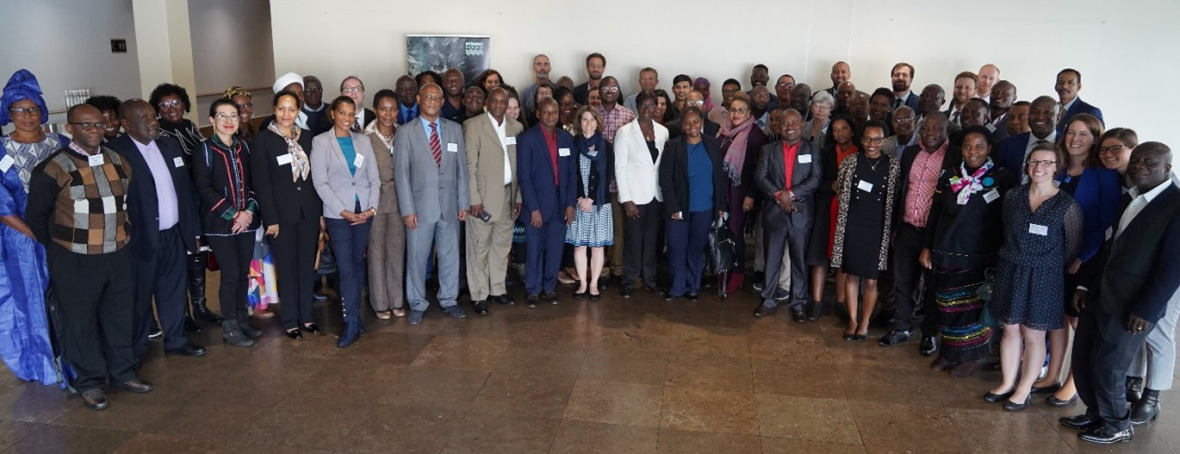Stakeholder Engagement is Key to Effective Conservation and Sustainable Use of Marine Biodiversity
23.05.2022
The conservation and sustainable use of biodiversity in areas beyond national jurisdiction (ABNJ) is a shared responsibility of all nations. But current regulations and policies are ineffective to address comprehensive marine environmental protection. Over its five-year duration, the STRONG High Seas project (‘Strengthening Regional Ocean Governance for the High Seas’) has advanced the development of integrated approaches for ABNJ in the Southeast Atlantic and Southeast Pacific.

“Marine biodiversity is threatened by intensifying human activities, such as fishing, shipping and cable laying, as well as by pollution and climate change. The connectivity between ABNJ and coastal waters means that impacts on marine ecosystems in ABNJ will also have impacts on marine ecosystems closer to shore, and vice versa, and, in turn, impacts on the societies and economies of States and coastal communities”, explains Carole Durussel, scientific co-lead of the project.
The analysed regions in the Southeast Atlantic and Southeast Pacific are characterised by important oceanic currents contributing to high marine productivity. States in these regions have recognised the need to strengthen ocean governance for the conservation and sustainable use of biodiversity, including the role of global and regional organisations. Since 2018, global negotiations have been underway for a legally binding international agreement, with the objective of conservation and sustainable use of marine biodiversity in ABNJ (known as the ‘BBNJ Agreement’).
“Over the last five years, we have used a participative multi-stakeholder approach to develop and implement all project activities of the STRONG High Seas project. Our aim was to ensure stakeholder engagement and buy-in, raise awareness about the need to conserve and sustainably use marine biodiversity in ABNJ, and create a network of and dialogue between relevant stakeholders within the two focal regions, and beyond”, says scientific co-lead Ben Boteler.

As the STRONG team is completing their work this month, they have published recommendations and reflections on integrated and cross-sectoral approaches to the conservation and sustainable use of marine biodiversity in ABNJ, including the following insights on coordinating a participative and transdisciplinary multi-stakeholder project:
- Participative multi-stakeholder processes are essential to ensure experiences and information exchange between stakeholder groups, thereby fostering mutual learning and collaboration across actors and organisations to underpin decision-making and support progress towards policy targets. Transdisciplinary research projects can offer a needed platform to bring together diverse stakeholder groups and champion collaborative processes for sharing of lessons learnt and best practices, building new networks, and offering a space for stakeholders to engage and discuss outside of formal policy processes.
- Transdisciplinary research projects should consider the timing of relevant policy processes and tailor their efforts and interventions towards contributing to policy discussions. The STRONG High Seas focussed primarily on facilitating an understanding of scientific, legal, and governance content. Towards the project end, topics more specific to management or implementation of the BBNJ Agreement were considered.
- Transdisciplinary research projects provide an important networking and relationship-building opportunity for stakeholders from diverse groups, different regions, and countries. Implementing a participative multi-stakeholder approach will help to build a community of practice that will continue to expand and grow beyond the close of the research project, continuing long-term support of project goals.
- Co-creative processes to support decision making and achieve policy impact through incorporating ideas, scientific knowledge, and perspectives from stakeholders for the development of project outputs, require flexibility to adapt to shifts in political priorities, changing mindsets, and institutional and individual learning. It will be necessary to re-evaluate project objectives throughout its implementation and identify new engagement opportunities or shift to new activities to ensure a successful strategy is maintained.
The project was funded through the International Climate Initiative (IKI) of the German Federal Ministry for the Environment, Conservation, Nuclear Safety and Consumer Protection (BMUV), coordinated by the Institute for Advanced Sustainability Studies (IASS), and implemented together with partners based in Africa, Europe, and South America, including the Secretariat of the Comisión Permanente del Pacífico Sur (CPPS) and the Abidjan Convention Secretariat.
More information:
The project website remains available and a repository of all publications and resources is accessible online (in English, Spanish, and French), offering a wealth of information. Some recent highlights include:
- Glossary of Ocean Governance Terms;
- Guidance to achieve biodiversity conservation measures in high seas fisheries;
- Lessons Learned and Options for an Implementation and Compliance Committee;
- An overview of existing and recommended conservation and management measures for the Southeast Atlantic and Southeast Pacific regions;
- Reflections and recommendations for capacity development for the conservation of marine biodiversity in ABNJ in the Southeast Atlantic and Southeast Pacific regions;
- Considerations for integrated ocean management for the conservation and sustainable use of ABNJ in the Southeast Atlantic and Southeast Pacific regions;
- Reflections from the STRONG High Seas Project on applying a participative multi-stakeholder approach in transdisciplinary ocean governance research.

Contact

